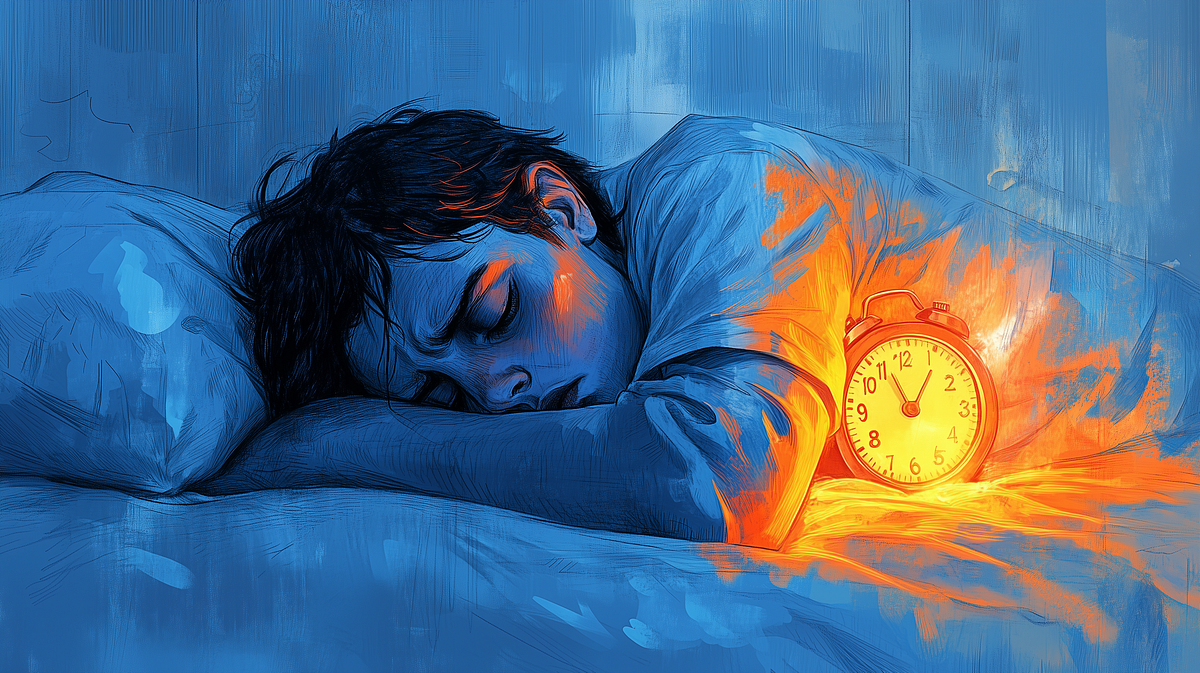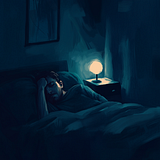Alarms Are Ruining Your Sleep : Here’s How to Fix It
Fix your sleep, wake up naturally, and stop relying on anxiety-driven wake-ups.

You don’t have a waking up problem. You have a sleep problem.
Think about the nights you’ve struggled to fall asleep. Was it because your body wasn’t tired? Or was it because your mind wouldn’t shut up looping through tomorrow’s responsibilities, the alarm waiting to jolt you awake, the fear of oversleeping? That’s the real issue.
We blame alarms for being necessary when, in reality, they’re part of the reason we sleep poorly in the first place.
The anxiety of knowing you have to wake up at a specific time creates a pressure loop, one that makes falling asleep harder, wrecking the natural rhythm that would otherwise wake you up on time without the jarring sound of an alarm.
The Real Problem: It’s Not Waking Up, It’s Falling Asleep
It’s easy to assume that waking up is the challenge, but the real battle starts the night before.
You’ve probably had nights where you couldn’t sleep because of something big the next day — an early flight, an important meeting, a test back when you were in school.
That anxious feeling? That’s what a lot of people experience every night, just in a less obvious form.
The mind doesn't just shut off when you lie down. It runs through unfinished tasks, upcoming obligations, and worst-case scenarios. And when you add an alarm to the mix — a reminder that no matter what, you have to wake up at a specific time — you’ve now put yourself under pressure before you even fall asleep.
Even when you do fall asleep, your brain is still engaged. That’s why you wake up feeling like you never truly rested. The cycle repeats: poor sleep leads to more anxiety about waking up, making it even harder to fall asleep the next time.
Breaking this cycle starts with understanding one thing: the key to waking up easily isn’t when you wake up — it’s how you fall asleep.
Step One: Figure Out How Much Sleep You Actually Need
Most people don’t know their ideal sleep duration because they’ve never had a chance to test it. They wake up to alarms every day, cutting sleep short without ever finding out how long they actually need.
If you want to break free from alarms, the first step is figuring out your natural sleep requirement. And the best way to do that? Low-stakes testing.
Find a few days where you don’t have major responsibilities the next morning — a weekend, holiday, or even just a day or two where your schedule is lighter. On those nights, let yourself fall asleep naturally, and most importantly, don’t set an alarm. Do this a few times, as close together as possible, to avoid that much variation.
What you’re looking for are two things:
- How long you sleep when left undisturbed
- What you previously would’ve considered “oversleeping”
See, the thing is, people throw around the term “overslept” like it’s a failure, when in reality, it just means your body was making up for lost rest. If you are the type that consistently needs 8.5 hours to feel refreshed but have been forcing yourself to wake up after 6, the problem isn’t that you’re oversleeping — it's that you’ve been under-sleeping all along.
The Myth of Less Sleep = More Productivity
There’s a cultural obsession with this narrative that successful people sleep less; That if you want to “make it,” you have to be willing to run on fumes to wake up early and tackle the day. But that’s complete nonsense.
High performers don’t compromise on sleep for an early schedule, but rather, due to them prioritizing sleep, it is how they manage to wake up so early.
Athletes, CEOs, and top creatives all understand that good sleep is the foundation of performance. Skipping it doesn’t make you more productive; it just makes you worse at everything.
The truth is, good sleep isn’t a luxury — it's a competitive advantage.
Step Two: Fixing Sleep Means Fixing the Night Before
Once you know how much sleep you need, the next step is consistency — no so much in when you go to bed, but in how long you sleep.
I say this from experience. As someone who has struggled with insomnia for most of my life. There were countless nights where I’d lie in bed for hours, waiting for sleep that never came. I always thought the problem was waking up, but it was always about falling asleep. I had to build my rituals to get better sleep, and if you’re in the same boat, I wrote about the process and the steps I took that helped me break the cycle:

That article covers my full approach, so I won’t go into too much detail here. But the core sentiment is this:
Forget the idea that you have to sleep at the exact same time every night. That’s unrealistic. What matters is that you’re hitting your required hours consistently.
Why? Because the body builds a rhythm. If you regularly get your full sleep, your internal clock adapts, and waking up at the right time becomes effortless.
Why You Don’t Actually Need an Alarm
When your sleep is dialed in, alarms become necessary.
Your body has an internal clock, and once it’s tuned correctly, you’ll start waking up naturally at the same time every day, without an external shock. Ever notice how sometimes you wake up minutes before your alarm? That’s proof your body already knows when it’s time.
The only reason people feel they need alarms is that their sleep is inconsistent. They go to bed at different times and wake up groggy and blame it on not being a “morning person.” But in reality, they’re just fighting their own biology.
And here’s where the fear of oversleeping really comes in.
People cling to alarms because they’ve been told that sleeping in is a bad thing. If you wake up later than expected, it means you’re lazy, unmotivated, or unproductive. But what if that’s just your body trying to fix the damage?
Oversleeping isn’t the problem — sleep debt is. Alarms don’t solve sleep debt; they just mask it. Every single time you cut your sleep short with an alarm, you’re digging yourself into a deep hole that makes sleeping harder, waking up worse, and fatigue a constant background noise in your life.
If you want to break the cycle, you have to reframe how you think about sleep. It’s not about avoiding oversleeping. It's about getting enough sleep consistently so your body doesn’t have to overcompensate in the first place.
And once you do that? You’ve never go back.



